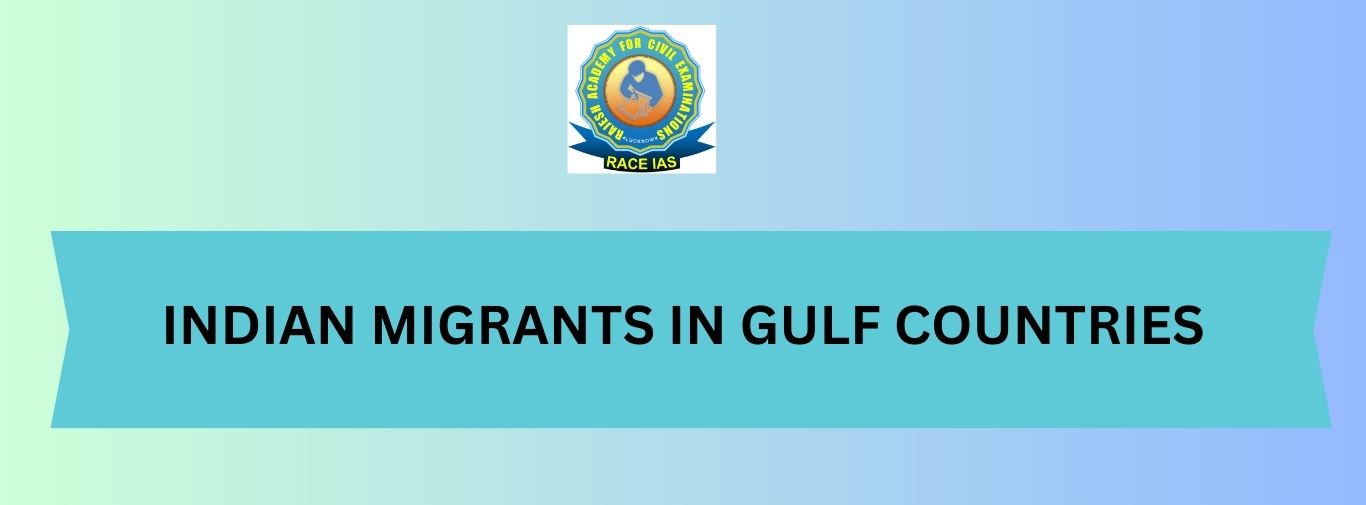
INDIAN MIGRANTS IN GULF COUNTRIES
INDIAN MIGRANTS IN GULF COUNTRIES
19/06/24
GS Paper II (International Relations)
UPSC/PSC
Source : The Hindu
Context : The recent case of extremely devastating fire break out in an apartment of Kuwait city, causing loss of 49 lives with approximate 45 victims belonging to India.
Other such cases previously have also been noted of human rights violation during the FIFA World cup in Qatar, construction of Dubai EXPO etc.
Significance of Indian Migrants workers -
For India :
- One- sixth of India's total trade takes place with the gulf region.
- The global connection of India with GCC countries in areas of energy cooperation.
- Betterment of trade and diplomatic relations between India and such countries resulting in efficient cultural exchange and business ties.
- Exposure of Indian migrants to new technologies and skills.
For Gulf Countries-
- Indian migrants fulfill the demanded labour population in Gulf counties in the field of transport, healthcare, household services, constructions etc.
- Exchange of rich Indian culture, language and cuisine with that of those respective nations.
- The labour force excels the industrial development, job creation as well as the consumer base of GCC countries.
- The Indian migrants saturate the job composition of gulf countries with most of them working in blue-collared jobs.
Challenges faced by the Indian workers in Gulf countries -
- Insecure and exploitative work conditions – longer hours of work, refuse to pay for overtime work, less safety gear resulting in accidents and injuries like – 2019 Heatstroke deaths in UAE.
- Kafala system – The method of tying the visa of migrant with that of the employers resulting in employers abuse, difficulty in changing jobs etc.
- Security risks – The 2014 ISIS abduction and mass killing of approx 40 Indian migrants in Iraq is big example.
- Limited rights – The inability of Indian migrants to participate in politics, own property.
- Lack of details of migrants in own country and entry records maintenance in foreign lands makes it difficult to address the problems.
- Lack of legal aid and advise to the Indian migrants.
- Difference in living standards and lifestyle results in less cooperation and more dominance.
- Domestic household workers often face physical and psychological abuse.
Government initiatives to ensure welfare of migrants -
- The Emigration Act of 1983 – a legal structure to tap records and issues of Indian migrants to other countries and defines a regulation to be followed by the employers.
- E-Migrate System – As a counter to fake-recruiters and unregistered agents, it provides skilled workforce to get easy emigration clearance and tracks the live status.
- Bilateral Labour agreements – India has established labour agreements with certain countries providing protection to the Indian migrants.
- PDOS – Pre- Departure Orienation Programs qualitates the soft professional skills of Indian migrant workers.
- Indian community welfare – to provide the community based smooth financial support whenever required.
- Surakshit Jaaye Prasikshit Jaaye‘(Go Safe, Go Trained) – Introduced to encourage safe and live emigration.
Way Forward
- Boosting the legal base of Indian migrant workers.
- Introducing more applications and schemes like e-miggrate system.
- Establishment of Quick grievance mechanism.
- Improves cordial democracy and good relations between both the countries.
- Promoting cultural skill integration – exchange of community culture and lifestyle to adapt efficiently.
UPSC Mains practice question -
Highlight the issues regarding Indian migrants in Gulf countries. Discuss the need for national as well as international policies in the welfare of international migration of such Indian workers.